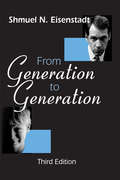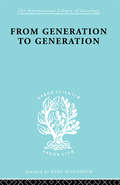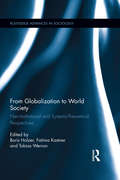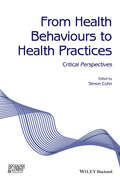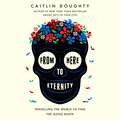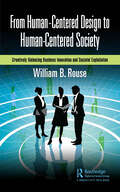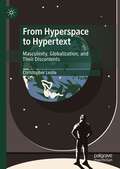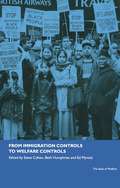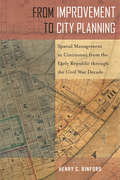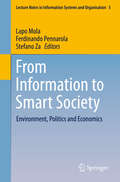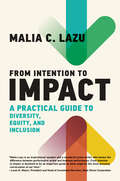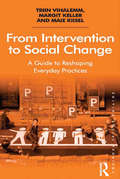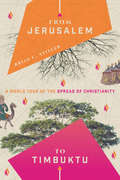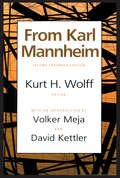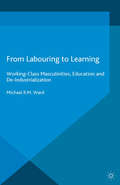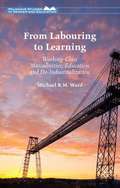- Table View
- List View
From Fossil Fuels to Low Carbon Energy Transition: New Regulatory Trends in Latin America (Energy, Climate and the Environment)
by Geoffrey Wood Juan Felipe Neira-CastroFocusing on five key themes - hydrocarbons, electricity, mining, social license to operate, and arbitration/dispute resolution- via in-depth country and regional case studies, this book seeks to capture the contrasting and sometimes conflicting trends in energy governance in Latin America as it wrestles with a dependence on fossil fuels whilst shifting toward a low carbon future. Energy transition continues to sit at the centre of the Latin American policy debate as the world continues to push for carbon neutrality by 2050. Latin America is undergoing a renewable energy transition, with substantial reserves (solar, wind, hydro, geothermal) and many countries in the region setting ambitious renewable energy policies, laws, and regulations to address climate change. However, recent initiatives to promote renewables must be placed in context. Historically, Latin America has developed and improved its economic and social standards due primarily to an economy based on the extractive industries and fossil fuels. This places renewables at the crossroads of multiple drivers, as the region seek to ensure security of supply, attract investment, and facilitate a low carbon energy transition.
From Fritzl to #metoo: Twelve Years of Rape Coverage in the British Press (Palgrave Studies in Language, Gender and Sexuality)
by Alessia TrancheseThis is the first longitudinal study of the language used by the British press to talk about rape. Through a diachronic analysis informed by corpus linguistics and feminist theory, Tranchese examines how rape discourse has (or has not) changed over the past decade. With its detailed investigation of media representations, the book explores how age-old myths about sexual violence re-emerge in different forms within news narratives. Against the backdrop of twelve years of newspaper coverage of rape, including many high-profile cases, this study also traces the rise of “celebrity culture”, the emergence of #metoo, and the development of the backlash against it. The author places these historical events and recent trends within broader debates on feminism and the role played by (social) media in shaping contemporary rape discourse. This book provides a much-needed linguistic analysis which will be of particular interest to scholars and students of feminist studies, language and gender, corpus-assisted discourse studies, and gendered crime.
From Generation to Generation
by Shmuel N. EisenstadtThe republication of From Generation to Generation-almost half a century after its first appearance in 1956-constitutes a good occasion for a look at the way in which problems of youth and generations developed in contemporary societies. In this brilliant, pioneering effort, different approaches in the social sciences to the analysis of these issues receive close scrutiny. Eisenstadt reexamines these issues by including in this edition several new chapters on this theme.
From Generation to Generation: Age Groups and Social Structure (International Library of Sociology #Vol. 131)
by S. N. EisenstadtFirst published in 1998. Routledge is an imprint of Taylor & Francis, an informa company.
From Globalization to World Society: Neo-Institutional and Systems-Theoretical Perspectives (Routledge Advances in Sociology)
by Boris Holzer Fatima Kastner Tobias WerronSince the 1970s, various sociological approaches have tried to understand and conceptualize "the global," yet few of them have systematically addressed the full spectrum of social relationships. Prominent exponents of the global approach - such as world systems analysis - instead have focused on particular domains such as politics or the economy. Under the label of "world society," however, some authors have suggested alternatives to the predominant equivocation of society and the nation-state. The contributions to this volume share that objective and take their point of departure from the two most ambitious projects of a theory of world society: world polity research and systems theory, mapping out the common ground and assessing their potential to inform empirical analyses of globalization.
From Health Behaviours to Health Practices: Critical Perspectives (Sociology of Health and Illness Monographs)
by Simon CohnA wide range of international contributions draw on theoretical and empirical sources to explore whether alternatives exist to both conceptualise and conduct research into what people do and don’t do, in relation to their health and experiences of illness. Presents a collection of international contributions that complement, as well as critique, dominant conceptualisations of health behaviour Includes a wide range of both theoretical perspectives and empirical cases Reasserts the unique contribution social sciences can make to health research Challenges assumptions about the usefulness of the concept of health behaviour A timely publication given the rise of chronic and lifestyle diseases and the resulting changes in global health agendas
From Hello to Goodbye: Proactive Tips for Maintaining Positive Employee Relations
by Christine V. WaltersUnderstanding the full scope of the employee experience - from entry to exit - strengthens HR's impact and mitigates risk. Evaluating the complete employment relationship in reverse - from departure through hire - From Hello to Goodbye is the HR professional's complete guide to understanding the various ways business relationships end, managing disability and leave issues, properly classifying workers, maintaining an inclusive workplace, increasing retention and avoiding litigation.This updated second edition incorporates new legal developments, best practices and compliance requirements while offering practical advice on managing emotional reactions, making the case for inclusion and addressing workplace safety.A trusted resource for HR professionals, the book blends legal insight with hands-on tips to support both people and organizational health.
From Here to Eternity: Travelling the World to Find the Good Death
by Caitlin DoughtyAs a practising mortician, Caitlin Doughty has long been fascinated by our pervasive terror of dead bodies. In From Here to Eternity she sets out in search of cultures unburdened by such fears. With curiosity and morbid humour, Doughty introduces us to inspiring death-care innovators, participates in powerful death practices almost entirely unknown in the West and explores new spaces for mourning - including a futuristic glowing-Buddha columbarium in Japan, a candlelit Mexican cemetery, and America's only open-air pyre. In doing so she expands our sense of what it means to treat the dead with 'dignity' and reveals unexpected possibilities for our own death rituals.
From Here to Eternity: Travelling the World to Find the Good Death
by Caitlin DoughtyAs a practising mortician, Caitlin Doughty has long been fascinated by our pervasive terror of dead bodies. In From Here to Eternity she sets out in search of cultures unburdened by such fears. In rural Indonesia, she observes a man clean and dress his grandfather's mummified body. She meets Bolivian ñatitas (cigarette-smoking, wish-granting human skulls), and introduces us to the Japanese ritual of kotsuage, in which relatives use chopsticks to pluck their loved-ones' bones from cremation ashes. With curiosity and morbid humour, Doughty introduces us to inspiring death-care innovators, participates in powerful death practices almost entirely unknown in the West and explores new spaces for mourning - including a futuristic glowing-Buddha columbarium in Japan, a candlelit Mexican cemetery, and America's only open-air pyre. In doing so she expands our sense of what it means to treat the dead with 'dignity' and reveals unexpected possibilities for our own death rituals.Read by Caitlin Doughty(p) 2017 Recorded Books LLC
From Hire to Liar: The Role of Deception in the Workplace
by David ShulmanThis book offers a sociological study of the rationales for, and methods of, workplace deception. The author begins by presenting an ethnographic analysis of private detectives' routine use of deception as an officially-sanctioned component of their work. He then uses interviews and case-studies to show how similar strategies are used in a variety of other work environments. The author discusses the justification and effects of workplace deception on both workers and employers.
From Homer to Helen Keller: A Social and Educational Study of the Blind
by Richard Slayton French<P>From Homer to Helen Keller, Homer stands for the greatest achievement of the blind in the times antecedent to their systematic education. He stands for all those bards, many of them blind or blinded, creators of literature and makers of our language, who through ballads, always of great vigor and sometimes of surpassing beauty, have handed down to us the glorious traditions of far-off heroic times. <P>Miss Keller stands for the supreme achievement of education. The blind claim her, but the deaf can claim her, too, and modern education can claim her more than either--and all humanity claims her with the best claim of all. For she is the epitome of all that is best in humanity, all that is most spiritual; and all this through conscious aim and directed effort, through education in its best sense.
From Hometown to Battlefield in the Civil War Era
by Timothy R. MahoneyMahoney examines how members of the middle class from small cities across the great West were transformed by boom and bust, years of recession, and civil war. He argues that in their encounters with national economic forces, the national crisis in politics, and the Civil War, middle class people were cut adrift from the social identity that they had established in the 'face to face' communities of the 'hometowns' of the urban West. By grounding them in their hometown ethos, and understanding how the Panic of 1857 and the subsequent recession undermined their lives, the author provides important insights into how they encountered, responded to, and were changed by their experiences in the Civil War. Providing a rare view of social history through the framework of the Civil War, the author documents, in both breadth and depth, the dramatic change and development of modern life in nineteenth-century America.
From Human-Centered Design to Human-Centered Society: Creatively Balancing Business Innovation and Societal Exploitation
by William B. RouseA human-centered society creatively balances investments in sources of innovation, while also governing in a manner that eventually limits exploitation by originators once innovations have proven their value in the marketplace, broadly defined to include both private and public constituencies. The desired balance requires society to invest in constituencies to be able to create innovations that provide current and future collective benefits, while also assuring society provides laws, courts, police, and military to protect individual rights to life, liberty, and the pursuit of happiness. The balance addresses collectivism vs. individualism. Collectivism emphasizes the importance of the community. Individualism, in contrast, is focused on the rights and concerns of each person. Unity and selflessness or altruism are valued traits in collectivist cultures; independence and personal identity are central in individualistic cultures. Collectivists can become so focused on collective benefits that they ignore sources and opportunities for innovation. Individualists can tend to invest themselves, almost irrationally, in ideas and visions, many of which will fail, but some will transform society. Collectivists need to let individualists exploit their successful ideas. Individualists need to eventually accept the need to provide collective benefits. This book addresses the inherent tension underlying the pursuit of this balance. It has played a central role in society at least since the Industrial Revolution (1760–1840). Thus, the story of this tension, how it regularly emerges, and how it is repeatedly resolved, for better or worse, is almost a couple of centuries old. Creating a human-centered society can be enabled by creatively enabling this balance. Explicitly recognizing the need for this balance is a key success factor. This book draws upon extensive experiences within the domains of transportation and defense, computing and communications, the Internet and social media, health and wellness, and energy and climate. Balancing innovation and exploitation takes varying forms in these different domains. Nevertheless, the underlying patterns and practices are sufficiently similar to enable important generalizations.
From Hyperspace to Hypertext: Masculinity, Globalization, and Their Discontents
by Christopher LeslieThis book illuminates how science fiction studies can support diversity, equity, and inclusion in science and engineering. Shortly before science fiction got its name, a new paradigm connected whiteness and masculinity to the advancement of civilization. In order to show how science fiction authors supported the social construction of these gender and racial norms – and also challenged them – this study analyzes the impact of three major editors and the authors in their orbits: Hugo Gernsback; John W. Campbell, Jr.; and Judith Merril. Supported by a fresh look at archival sources and the author’s experience teaching Science and Technology Studies at universities on three continents, this study demonstrates the interconnections among discourses of imperialism, masculinity, and innovation. Readers gain insights into fighting prejudice, the importance of the community of authors and readers, and ideas about how to challenge racism, sexism, and xenophobia in new creative work. This stimulating book demonstrates how education in science, technology, engineering, and mathematics (STEM) can be enhanced by adding the liberal arts, such as historical and literary studies, to create STEAM.
From Immigration Controls to Welfare Controls (The\state Of Welfare Ser.)
by Steve Cohen Beth Humphries Ed MynottThis edited collection addresses theoretical, political and practical aspects of the connection between external immigration controls and internal welfare controls. It considers the implications for the both those subject to controls and those drawn into the web of implementing internal welfare controls. Topics discussed include:* forced dispersal of asylum seekers* local authority and voluntary sector regulations* nationalism, racism, class and 'fairness'* strategies for resistance to controls* USA controls.The book provides support to those unwittingly drawn into administering controls, showing how the role of welfare workers as immigration control enforcers is not a sudden imposition but has exisited since the introduction of controls in 1905.From Immigration Controls to Welfare Controls will provide a valuable resource for all those professionals who come into contact with the issues surrounding immigration.
From Improvement to City Planning: Spatial Management in Cincinnati from the Early Republic through the Civil War Decade (Urban Life, Landscape and Policy)
by Henry C. BinfordFrom Improvement to City Planning emphasizes the ways people in nineteenth-century America managed urban growth. Historian Henry Binford shows how efforts to improve space were entwined with the evolution of urban governance (i.e., regulation)—and also influenced by a small group of advantaged families. Binford looks specifically at Cincinnati, Ohio, then the largest and most important interior city west of the Appalachian Mountains. He shows that it was not just industrialization, but also beliefs about morality, race, health, poverty, and “slum” environments, that demanded an improvement of urban space. As such, movements for public parks and large-scale sanitary engineering in the 1840s and ’50s initiated the beginning of modern city planning. However, there were limitations and consequences to these efforts.. Many Americans believed that remaking city environments could also remake citizens. From Improvement to City Planning examines how the experiences of city living in the early republic prompted city dwellers to think about and shape urban space.
From Information to Smart Society
by Lapo Mola Ferdinando Pennarola Stefano ZaThis book presents a collection of research papers focusing on issues emerging from the interaction of information technologies and organizational systems. In particular, the individual contributions examine digital platforms and artifacts currently adopted in both the business world and society at large (people, communities, firms, governments, etc. ). The topics covered include: virtual organizations, virtual communities, smart societies, smart cities, ecological sustainability, e-healthcare, e-government, and interactive policy-making (IPM). The book offers a multidisciplinary perspective on a variety of information systems topics. It is also particularly relevant to information systems practitioners such as IS managers, business managers and policy makers. The content is based on a selection of the best papers (original double-blind peer-reviewed contributions) presented at the annual conference of the Italian chapter of AIS, which was held in Milan, Italy in December 2013.
From Intention to Impact: A Practical Guide to Diversity, Equity, and Inclusion (Management on the Cutting Edge)
by Malia C. LazuHow business leaders can move their DEI efforts from intention to impact through strategy and culture change.In the aftermath of George Floyd&’s murder, corporate America has doubled down on its public intentions to be more inclusive and equitable. Yet beyond the pledges it is difficult to see which system changes make a real difference. In From Intention to Impact, Malia Lazu draws on her background as a community organizer, her corporate career as a bank president, and now her experience as a leading DEI consultant to explain what has been holding organizations back and what they need to do better. First and foremost, she recognizes that truly moving from intention to impact means targeting and changing the traditions and culture that normalize whiteness.From Intention to Impact shows what organizations, leaders, and people at all levels must do to create more inclusive environments that honor and value diversity. Lazu shares a seven-stage guide through this process as well as a 3L model of listening, learning, and loving that readers can use from the initial excitement of doing &“something&” to the frustration when the inevitable pushback comes, and finally to the determination to do the hard work despite the challenges—on corporate and political fronts. Most compelling, From Intention to Impact shows that, while commitment from the top is paramount, for DEI to be most effective, it needs to be decentralized—among managers, within teams, and across the organization.A crucial read for anyone looking to future-proof their company, From Intention to Impact goes beyond the &“feel good&” PR-centric actions to showcase the real DEI work that must be done to create true and lasting systemic change.
From Intercivilizational Encounters to Intercivilizational Analysis: Reflections on Robertson’s Views of the Global Human Condition, and Beyond (Emerging Globalities and Civilizational Perspectives)
by Ino RossiThis volume contributes to Roland Robertson’s (1938-2022) thinking on the impact of civilizational traditions on contemporary global relations. It also includes chapters by Robertsonian scholars on the social implications of intercivilizational encounters. Through theoretical discussions and ethnographic documentation, the volume highlights the importance of human needs and aspirations at the center of civilizational analyses. It offers an original methodology to formulate intercivilizational principles of moral order and a related intercivilizational imaginary. Readers will find in this volume a much-needed strategy to transform contemporary civilizational conflicts and manipulations into intercivilizational undertakings in reciprocal understanding, learning, and cooperation. This volume includes contributions from noted globalization scholars and is a must-read for those interested in macro-perspectives on globalization and global processes.
From Intervention to Social Change: A Guide to Reshaping Everyday Practices (Solving Social Problems)
by Margit Keller Triin Vihalemm Maie KiiselThis book explores the design, communication and implementation of social change programmes aimed at solving various social problems, from reducing health-risk behaviour to ’green’ consumption or financial literacy. Examining the application of social practice theory as a way of understanding social change, From Intervention to Social Change connects theoretical reflections with empirical research, sample cases and exercises, emphasising the importance of communication and community engagement in the initiation and implementation of social change programmes designed to address social problems and improve quality of life. Adopting a ’communication for social change’ approach and presenting illustrative studies drawn from ’developed’ and rapidly transforming countries, this handbook will appeal to project managers and communication professionals in the public and private sectors, as well as scholars of sociology, anthropology and development studies with interests in social problems and social change.
From Jerusalem to Timbuktu: A World Tour of the Spread of Christianity
by Brian C. StillerChristianity started in Jerusalem. For many centuries it was concentrated in the West, in Europe and North America. But in the past century the church expanded rapidly across Africa, Latin America, and Asia. Thus Christianity's geographic center of density is now in the West African country of Mali—in Timbuktu. What led to the church's vibrant growth throughout the Global South? Brian Stiller identifies five key factors that have shaped the church, from a renewed openness to the move of the Holy Spirit to the empowerment of indigenous leadership. While in some areas Christianity is embattled and threatened, in many places it is flourishing as never before. Discover the surprising story of the global advance of the gospel. And be encouraged that Jesus' witness continues to the ends of the earth.
From Karl Mannheim
by Volker Meja David Kettler Kurt H. WolffKarl Mannheim's thought cuts across much of twentieth-century sociology, politics, history, philosophy, and psychology. This enlarged anthology convincingly demonstrates his centrality to present-day interpetive social and political theory. The posthumous publication of Structures of Thinking and the full text of Conservatism have made From Karl Mannheim more relevant than ever. This volume demonstrates Mannheim's self-awareness and self-critical rhetoric, his sensitivity to cultural contexts, his experimental approach to systems of ideology, his recognition of multiple modes of knowing, and other features of his unfinished theorizing.There is a strong affinity between Mannheim and contemporary interest in problems of cultural interpretation. New sensitivity to the issue of relativism in both social and cultural studies also depends heavily on Mannheim. The recent demise of communism in Eastern Europe and Russia has focused attention once more on relations between intellectuals in politics, and Mannheim is arguably the most influential thinker who placed this relationship at the center of informed discussion. The range and variety of the articles in this volume reveal him, once again, as a formidable experimental and innovative thinker.This expanded edition includes Mannheim's brilliant essay "The Problem of Generations." In a new substantial introduction, Volker Meja and David Kettler analyze previously unpublished writings by Mannheim. From Karl Mannheim is essential reading for social and political theorists, as well as for psychologists. As Emory S. Bogardus noted: "Mannheim's life-work is seen as an important, far-reaching and thoughtful complement to the work of sociologists who concentrate then- research in terms of behavioral science."
From Labouring to Learning: Working-Class Masculinities, Education and De-Industrialization (Palgrave Studies in Gender and Education)
by Michael R.M. WardHighly Commended in the Society of Educational Studies Book PrizeThis book explores how economic changes and the growing importance of educational qualifications in a shrinking labour market, particularly effects marginalized young men. It follows a group of young working-class men in a de-industrial community and challenges commonly held representations that often appear in the media and in policy discourses which portray them as feckless, out of control, educational failures and lacking aspiration. Ward argues that for a group of young men in a community of social and economic deprivation, expectations and transitions to adulthood are framed through the industrial legacy of geographically and historically shaped class and gender codes. These codes have an impact on what it means to be a man and what behaviour is deemed acceptable and what is not.
From Labouring to Learning: Working-Class Masculinities, Education and De-industrialization (Palgrave Studies in Gender and Education)
by Michael R.M. WardThis book explores how economic changes and the growing importance of educational qualifications in a shrinking labour market, particularly effects marginalized young men. It follows a group of young working-class men in a de-industrial community and challenges commonly held representations that often appear in the media and in policy discourses which portray them as feckless, out of control, educational failures and lacking aspiration. Ward argues that for a group of young men in a community of social and economic deprivation, expectations and transitions to adulthood are framed through the industrial legacy of geographically and historically shaped class and gender codes. These codes have an impact on what it means to be a man and what behaviour is deemed acceptable and what is not.
From Lance to Landis: Inside the American Doping Controversy at the Tour de France
by David WalshFor eight years, the Tour de France, arguably the world's most demanding athletic competition, was ruled by two men: Lance Armstrong and Floyd Landis. On the surface, they were feature players in one of the great sporting stories of the age-American riders overcoming tremendous odds to dominate a sport that held little previous interest for their countrymen. But is this a true story, or is there a darker version of the truth, one that sadly reflects the realities of sports in the twenty-first century?


